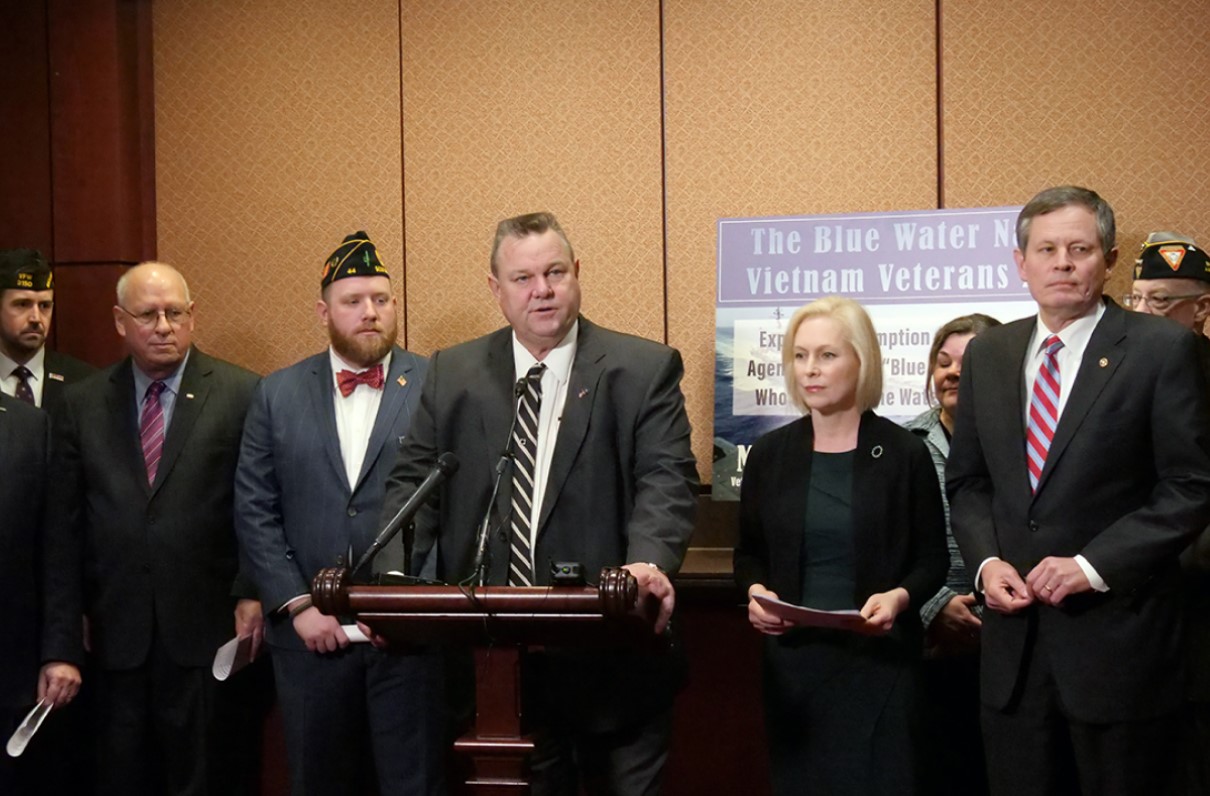Update: Read the letter from MOAA and other veterans organizations to President Donald Trump on behalf of Blue Water Navy veterans.
Representatives of MOAA and other veterans service organizations gathered alongside senators Tuesday to express continued support for legislation that would extend benefits to Vietnam-era Blue Water Navy veterans after a single senator blocked a vote on the measure the night before.
The bill would allow those who served aboard ships off the coast of Vietnam to claim presumptive exposure to Agent Orange, which is connected to a variety of cancers and other long-term illnesses. It passed the House without a single “nay” vote; it went before the Senate on Monday for a unanimous consent vote, which can be stopped by a single senator's dissension.
[TAKE ACTION: Tell Your Congressman to Support the Blue Water Navy Vietnam Veterans Act]
Sen. Mike Enzi, R-Wyo., objected, citing funding concerns. Fellow Republican Steve Daines of Montana stood with Democratic Sens. Jon Tester and Kirsten Gillibrand on Tuesday to encourage the full Senate to pass the legislation.
Republicans and Democrats “see the world a little differently at times, but on this issue, it's very, very clear,” Daines said. “I'm very disappointed to see this bill stalled … I urge my colleagues to support this. Let's get it done before the year's end.”
The bill must pass through the Senate, and onto President Donald Trump's desk, before the end of the 115th Congress -- Jan. 3, 2019 -- or the process will have to start all over again with the new Congress next year.
“We are closer than we've ever been at getting Congress to pass this legislation,” said Lt. Col. Aniela Szymanski, MOAA's director of government relations for VA benefits. “We will continue the fight to ensure the bill gets passed, but if it doesn't get passed this year, it may be two or more years that Congress takes up this legislation again. That type of delay just is not acceptable for our Vietnam veterans.”
Gillibrand said she will continue requesting a motion for unanimous consent.
'Our Veterans Are Too Important'
Earlier this year, VA Secretary Robert Wilkie questioned the scientific evidence and objected to the cost projections behind the proposal. He requested senators put a hold on the legislation until the completion of an ongoing VA study comparing the health of Vietnam War veterans with those of a similar age who did not deploy, which could be done in late 2019. Along with Enzi, Sen. Mike Lee, R-Utah, voiced opposition to the bill, saying he wanted to wait for the study to be completed.
MOAA, in a letter from the Military Coalition, recently addressed that study and pointed out that it will not provide any answers regarding Agent Orange exposures in Vietnam.
The cost of providing care to affected veterans has been estimated at more than $1 billion. Funding would be covered through an increased fee on VA home loans.
In a fiery speech, Gillibrand said Tuesday that she has been working on this legislation for more than 10 years. She called out the VA for not lending its support to the legislation.
“Do your job,” said Gillibrand, who submitted the legislation for the unanimous consent vote. “Your job is to protect and to speak for these veterans, not deny the basic health care that they have already earned.”
Tester, who serves as the ranking member of the Senate Veterans' Affairs Committee, said the legislation is long overdue. The Montana Democrat said it is the government's responsibility to care for veterans when they return from service.
“If we're not willing to take care of our veterans when they get back home, we should not send them to places in this world where they might be exposed to toxins or get shot,” Tester said. “This is serious business … our veterans are too important.”
Amanda Dolasinski is MOAA's staff writer. She can be reached at amandad@moaa.org. Follow her on Twitter @AmandaMOAA.

